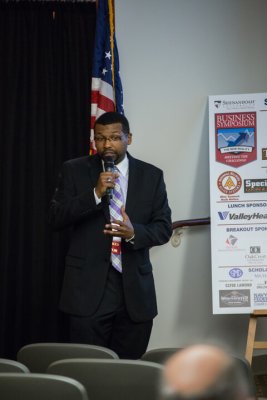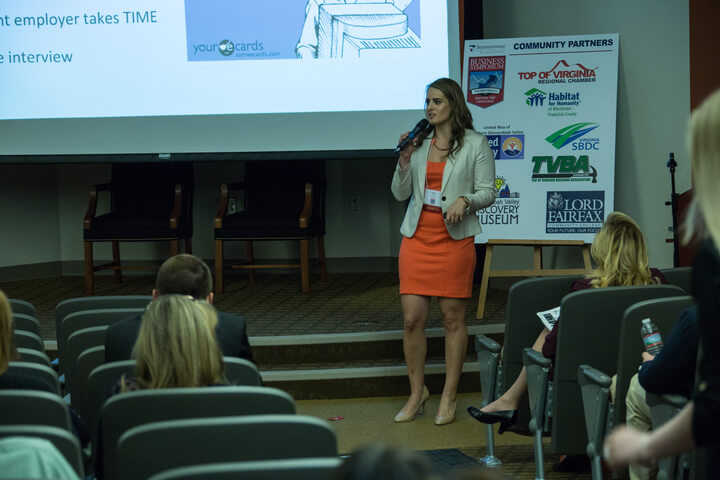College graduation is the culmination of years and years of effort. And yet, it also thrusts you into something new: the world of job seekers. Searching for and landing your first job out of college can be an eye-opening and daunting experience. However, two graduates of Shenandoah University’s Harry F. Byrd, Jr. School of Business have your back.
David Abraham ’08, ’09, MBA and Ashley Cross ’14, ‘16, MBA, joined forces at the Byrd School’s Eighth Annual Business Symposium offering a presentation born of hard-won wisdom: “10 Things I Learned About Getting a Job After Graduation.”
Both Abraham and Cross work in the Washington, D.C., metro area. Abraham is a deputy project manager for DRT Strategies, supporting the U.S. Department of Agriculture’s Farm Service Agency. Cross is a staffing manager for Robert Half’s OfficeTeam division.
Soon-to-be graduates filled Halpin-Harrison Hall’s Stimpson Auditorium to learn from the pair’s advice. And now, so can you.
David Abraham’s and Ashley Cross’ “10 Things I Learned About Getting a Job After Graduation”
1. Facebook Is forever
Actually, it’s not just Facebook. All social media posts are accessible to potential employers and can come back to bite you, Cross said. Google yourself and “Shenandoah University” and see what you find, because employers will Google you, too, and you’ll lose out if your history isn’t clean, she added.
However, you can also use social media to brand yourself. LinkedIn, in particular, is a huge resource for job-seekers. Go into as much detail and as in-depth as possible on your LinkedIn page, and tell your story, Abraham said.
2. Some things are now of the past….
The pair said those “things of the past” include winter and spring breaks; sleeping in and arriving late, or skipping work because you indulged in “Thirsty Thursday”; and turning in work late.
Instead, you do certain things in moderation, knowing that you have a responsibility to meet client deadlines and needs.
 3. Work/life balance is essential
3. Work/life balance is essential
You WILL need to make some sacrifices for your work as you start out, and you must always expect the unexpected. Client needs or deliverables may pop up, prompting you to cancel plans, but your dedication will benefit you in the long run, Abraham said.
Take what you’ve already learned about yourself as a student – that you’re an early riser, work better at night, or need to write down what you’re doing – and incorporate that knowledge into your work life, Cross said.
Abraham, who, like Cross, was an athlete at Shenandoah, recommended also utilizing the time management skills learned as a university athlete and to be willing to pull time away from some interests to get better at your job. Or, Cross said, you may have to schedule your life a little differently. If you feel a workout is very important, you may have to do it at 5 a.m. to make it fit into your work schedule.
“I like to earn my weekend,” Cross said. She manages her time by being fully devoted to work during the week. However, from the end of the workday Friday through Monday morning, she doesn’t talk about work at all.
4. Be professional
This is really about maintaining your personal brand and making a great impression, according to Abraham, who counsels job-seekers to dress the part, do your homework about a company’s culture, behave well during an interview (think about what you would do if your mom were watching, Cross added), and make clear what differentiates you from all the other candidates (here’s a hint: it might just be how well you dressed, understood the company and presented yourself).
5. Build relationships before and after graduation
Cross said the relationships she fostered at Shenandoah helped her prepare for getting a job after graduation. Through her Shenandoah connections, she landed two internships, a job and a graduate assistantship. She also suggested establishing relationships early on. As a freshman or sophomore, you’re in a great position to meet both your professors and classmates.
Also, Shenandoah students should take advantage of the business cards available to every student through bulk mail. They’re great to have, she said, and when you meet people you can hand them out. “Always keep them on you, always hand them out,” she said, noting that doing so helps build your brand.
Understanding how to build rapport is a useful job skill, too, Abraham said. When he meets a new client, he scopes out the room, looking to see if they have family pictures, sports memorabilia and the like around, so that he can talk with the client about something important to them. “Make your client happy to see you. Take an interest in them, and they’ll do the same for you,” he said.
6. Set professional goals
Set short-term and long-term goals and establish a five-year plan, Abraham said. Dive deep when you do this and be specific. In his case, his current short-term goal is to pass the Project Management Professional exam. His five-year goal is to be a senior IT project manager for the USDA.
As for Cross, her short-term goal was to graduate this year with her MBA with honors, while her long-term goal is to be a director of marketing.
It takes time to reach big goals, and it’s not a matter of luck getting there, said Abraham, quoting Byrd School of Business Dean Miles Davis, Ph.D., who says he doesn’t believe in luck, but instead believes in hard work. Abraham agrees.
7. You’re starting from the bottom. You’re UNEMPLOYED.
Recognize that earning a college degree doesn’t entitle you to a job. Differentiating yourself, however, will help lead you to work.
Your collegiate experience matters for your resume, but what you’re doing to get a job is even more important, Cross said, encouraging current students to go to Career Services to work on their resumes and interview skills, and follow up with contacts made prior to graduation. Polite persistence is key to landing a job, she said. If have an interview, remember to send a “thank you” card, too.
Abraham advised students to compose a clear, concise elevator speech, as well. Not sure what an elevator speech is? It’s a quick description of yourself – one you can give in the time it takes for an elevator to move between floors.
Also, take advantage of the time you have in college, Abraham said. This is the time when you can both make mistakes and meet people. As a sophomore, he met someone with whom he STILL has a great business relationship.
8. You have to enhance your skill set
Your skills can be your brand differentiator, Abraham said. Find out what skills the company/industry you want to work for needs, and fill those niches. “You want to be as well-rounded as possible.”
Take chances to travel, too. For Shenandoah University students, Cross said every one of them should apply for the Global Citizenship Project. She was selected to take the trip (a committee chooses participants on the basis of an essay to go on Spring Break trips designed as an introduction to international travel). Cross went to Nepal as part of GCP in 2014, and said the experience gives participants a global perspective.
9. Finding employment is NOT easy
Looking for a full-time job is a full-time job in and of itself, said Cross, who suggested attending career fairs while still in college.
Ask yourself if you’re truly exhausting every option when you’re trying to land the job you want. And, when you have an interview, REALLY prepare for it. The person interviewing you should be doing most of the talking, not the other way around, Abraham said. Have questions ready for your interviewer. Learn about the company. Be diligent. By doing this, you’ll separate yourself from the pack. He feels that an interviewer should be speaking 60 percent of the time, while you’re talking 40 percent of the time.
Also, as you’re looking for jobs and doing your diligence, you should be considering which companies feel like they’re right for you. Try not to make the mistake of accepting a job that’s a bad fit, Abraham said.
10. Sometimes a job is a job, not a true calling
It’s OK if the first job you get isn’t your dream job, Cross said. Don’t wait around for a year after graduation waiting for that dream job to appear and then have little to show for the year. “Do something, get some experience.”
You can still learn skills from a bad job, Abraham said. And, said Cross, it can show you what you do and do not want when it comes to workplace culture.
Also, if you take a less-than-perfect first job, don’t burn bridges when you eventually resign, Abraham said.. “Always leave on good terms. Always do your best. Always leave a good impression.” Remember, whenever you take a job, you represent not only yourself, but your business school, he said.




